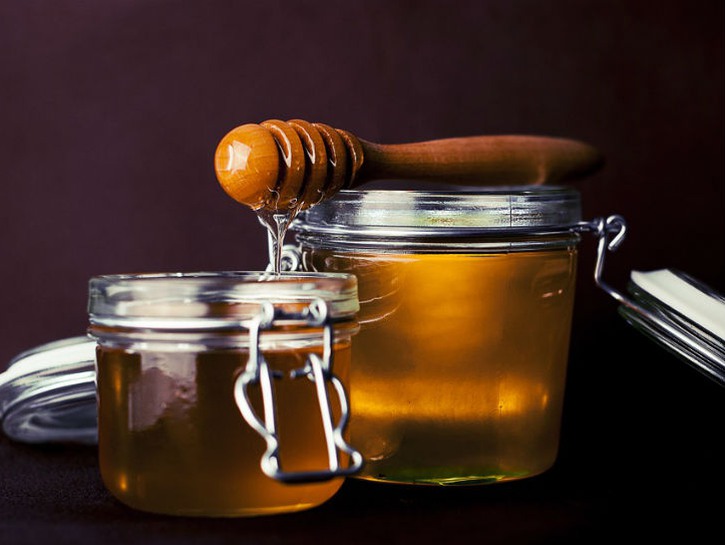What Is Manuka Honey?
Manuka honey comes from New Zealand and is extracted from the nectar of the Manuka tree. Bees then utilize this nectar to create the unique honey. Known for its distinctive amber hue, Manuka honey usually contains some form of methylglyoxal, which is what sets it apart from any imitation versions of Manuka honey. Additionally, Manuka honey is also measured by its UMF, or the Unique Manuka Factor, which measures the purity and quality of Manuka honey. The higher the quality of UMF, the more potent and pure the honey is.
Is It Safe?
For most people, Manuka honey is safe to consume. However, be cautious if you are diabetic or are sensitive to sugar – Maunka honey naturally has a high sugar content and can cause a spike in one’s blood sugar.

Manuka Honey Vs. Regular Honey
While certain commercial versions of standard honey can contain sweeteners, syrup and refined sugars, as well as being a blend of various types of honey, Manuka honey can only be made from the one specific plant — as such, the regulations behind making Manuka honey are very strict, meaning that a jar of Manuka honey will contain the exact ingredients needed to make that specific variety, rather than a combination of honey types, added sugars, and preservatives.
The biggest difference between Manuka honey and regular honey is the large presence of methylglyoxal, which gives Manuka honey its strong antibacterial components.
Manuka Honey Vs. Manuka Oil
While Manuka honey is incredibly nutritious, containing ample amounts of vitamins and minerals, it is not a good idea to ingest Manuka oil, as it is with other essential oils. Manuka oil is best used aromatically or as a rub for your skin. Manuka is very beneficial for treating topical skin concerns, such as dandruff, insect bites, and even allergies. The Manuka plant is harvested for its Manuka oil as well as nourishing honey. While Manuka oil is made in the same way as other kinds of honey, Manuka oil is extracted from the leaves of the same plant by steam distillation and is a source of nourishment that lends antiphotoaging properties, due to its high content of antibacterial qualities, called methylglyoxal, omega-3 fatty acids (DHA), and Leptosperin, a nectar that is found in the Manuka bush.

Benefits Of Manuka Honey
Of all the types of honey, Manuka honey is gaining attention for its elevated benefits. Here’s all the ways you can take advantage of it.
Antibacterial Effects
Manuka honey has been shown to have significant antibacterial effects, helping to fight off certain diseases and illnesses. A natural alternative to refined sugar, Manuka honey is a wonderful choice in lieu of the regular variety, as the high amount of sugar and acidity, paired with the low water content, helps to stunt the growth of microbes.
Healthy Skin
Manuka honey is also a wonderful choice when it comes to your skin, helping with tissue regeneration — this includes helping with skin dryness, cuts, bruises, and skin irritations, as well as aiding with acne treatment.
Additional Manuka Honey Benefits:
- Promotes healthy teeth and gums
- Serves as an anti-inflammatory supplement
- Has a healthy dose of antioxidants
- Reduction in gastric ulcers and IBS symptoms
- Improves the digestive system
- Eliminates infections
- May help treat cystic fibrosis

How To Use Manuka Honey
Manuka honey is incredibly versatile. Here’s some ways to use the honey in order to get the most out of its many benefits.
Sugar Substitute
Do you have sweet tooth? Try using Manuka honey as a sugar substitute! When baking, ditch the sugar and substitute for half the measure of honey. It’s important to note that if you do this, be sure not to cook at too high of a temperature or you might lose the honey’s natural enzymes.
Smoothie
Probably the tastiest way to take advantage of Manuka honey is by blending it into your favorite smoothie. Due to the honey’s sweetness, you might want to reduce the amount of fruit or yogurt you put into it so it doesn’t get overbearingly sweet.
Face Mask
Not only does Manuka honey have wondrous soothing and cleansing properties, but it is also a great natural moisturizer. Mix 1 teaspoon of Manuka honey with turmeric and full-fat yogurt and you have a simple DIY face mask that will leave your skin glowing and refreshed.
Heal Cuts and Infections
Manuka honey isn’t just for the face; it also great for first aid because of it’s antibacterial and soothing properties. Apply a thin layer to a cut, scrape, or minor burn and cover with band-aid and you’ll be healed in no time.
Hair Mask
Manuka honey works wonders for the hair. Not only does it help reduce hair loss, but it also helps control dandruff and frizz! Mix a teaspoon of Manuka honey of 5-10 UMF to your conditioner and enjoy silky smooth hair.
Mouthwash
Manuka honey’s antibacterial properties make it great for improving your oral health. Create your mouthwash by mixing Manuka honey with warm water and use after brushing your teeth.

Where To Buy Manuka Honey
Not all Manuka honey is created equal. Unfortunately, there’s a lot of fraudulent Manuka honey on the market. According to the New Zealand Ministry of Primary Industries, at least 8,300 tons of “Manuka honey” were fraudulently labeled in 2014. Instead of having real Manuka nectar, these honeys may have been supplemented with low cost honey or even corn syrup The key to buying Manuka honey is making sure it has the UMF© Trademark on the label.
Here are some reputable brands you can buy Manuka honey from. It isn’t the cheapest product, but at least it’s high quality.
If you’re shopping for Manuka honey, avoid these brands. Though these brands may contain nectar from Manuka flowers, their labels are misleading and not as high quality as they say they are.
- Wedderspoon Manuka Honey
- Manuka Doctor
- Trader Joe’s
